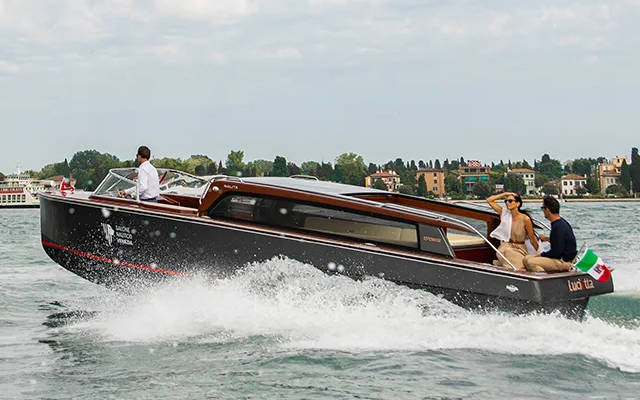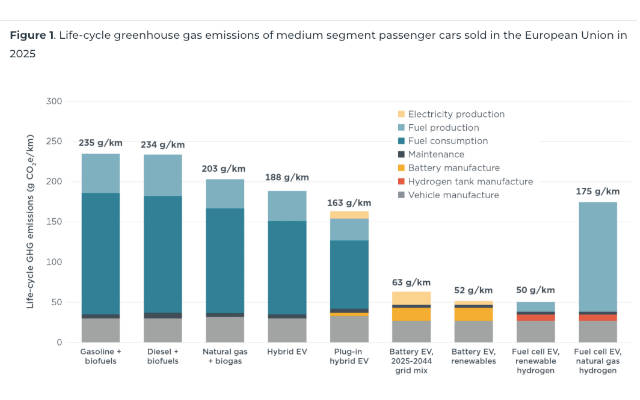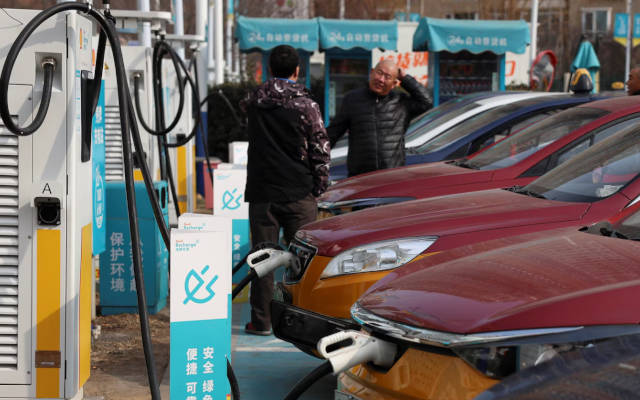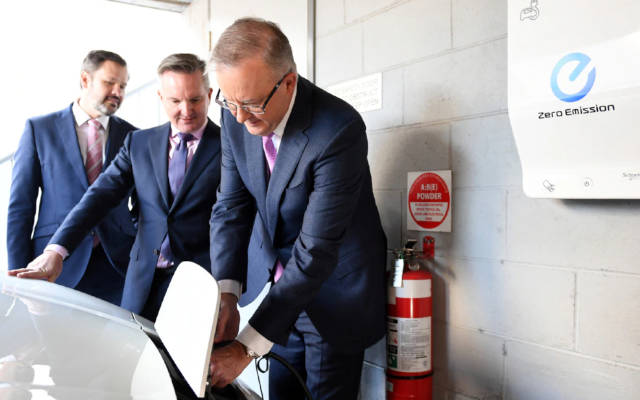 EDITOR'S PICK
EDITOR'S PICK
The First Fully Electric Venetian Water Taxi Can Cruise the Canals All Day
06 Aug 2025 | Synopsis
 Venice's first fully electric water taxi, Lucietta, was unveiled by Swiss energy firm Repower. Designed by Nauta Design and built in Murano, Lucietta combines traditional Venetian styling with electric propulsion—powered by a 200 kW motor and 180 kWh battery system. It can cruise a full working day (7–20 km/h) on a single charge, emits no direct pollutants, and cuts energy use by around 60% compared to diesel boats.
Venice's first fully electric water taxi, Lucietta, was unveiled by Swiss energy firm Repower. Designed by Nauta Design and built in Murano, Lucietta combines traditional Venetian styling with electric propulsion—powered by a 200 kW motor and 180 kWh battery system. It can cruise a full working day (7–20 km/h) on a single charge, emits no direct pollutants, and cuts energy use by around 60% compared to diesel boats.ICCT Study Ends Debate: EVs Drastically Cleaner Than Gasoline Cars
04 Aug 2025 | Synopsis
 A definitive life-cycle study by the ICCT confirms EVs in Europe are drastically cleaner than gas cars. Even including battery manufacturing, an EV's lifetime emissions are 66-69% lower. The initial "carbon debt" from production is repaid within just 1-2 years of driving. This environmental advantage is set to grow significantly as electricity grids become cleaner, validating pro-EV policies.
A definitive life-cycle study by the ICCT confirms EVs in Europe are drastically cleaner than gas cars. Even including battery manufacturing, an EV's lifetime emissions are 66-69% lower. The initial "carbon debt" from production is repaid within just 1-2 years of driving. This environmental advantage is set to grow significantly as electricity grids become cleaner, validating pro-EV policies.Your EV's Battery May Be Spying On You, New Study Reveals
04 Aug 2025 | Synopsis
 A new study from Chinese universities reveals hackers can track your EV. By analyzing your battery's unique "power fingerprint" at a public charger, they can reconstruct your exact driving routes, including home and work. This low-cost side-channel attack exposes a major privacy risk in the vehicle's battery management system, revealing a new frontier for automotive cybersecurity that goes beyond just software.
A new study from Chinese universities reveals hackers can track your EV. By analyzing your battery's unique "power fingerprint" at a public charger, they can reconstruct your exact driving routes, including home and work. This low-cost side-channel attack exposes a major privacy risk in the vehicle's battery management system, revealing a new frontier for automotive cybersecurity that goes beyond just software.EV Batteries Are Fit To Run A Home Or Even Power The Grid – But Some Car Brands Say "No"
04 Aug 2025 | Synopsis
 Vehicle-to-Grid (V2G) technology, which allows EVs to power the grid, faces significant roadblocks in Australia. The high cost and lack of compatible cars and chargers are key barriers. Unclear regulations, complex payment systems for EV owners, and consumer concerns about potential battery degradation are also hindering its widespread adoption. Overcoming these hurdles is crucial to unlocking V2G's potential to help stabilize the electricity grid.
Vehicle-to-Grid (V2G) technology, which allows EVs to power the grid, faces significant roadblocks in Australia. The high cost and lack of compatible cars and chargers are key barriers. Unclear regulations, complex payment systems for EV owners, and consumer concerns about potential battery degradation are also hindering its widespread adoption. Overcoming these hurdles is crucial to unlocking V2G's potential to help stabilize the electricity grid.5000 Years of Cautionary Tales: When Golliaths Fall It's Not An Accident
04 Aug 2025 | Synopsis
 "Luke Kemp's essay argues societal collapses are rarely accidents but acts of "self-termination." Throughout history, civilizations have failed by clinging to unsustainable practices for short-term gain, even when facing clear environmental threats. He posits our modern world is repeating this pattern with the climate crisis, suggesting our inability to change course is a form of collective, self-inflicted demise, not an unavoidable fate..and global collapse is coming unless inequality is vanquished."
"Luke Kemp's essay argues societal collapses are rarely accidents but acts of "self-termination." Throughout history, civilizations have failed by clinging to unsustainable practices for short-term gain, even when facing clear environmental threats. He posits our modern world is repeating this pattern with the climate crisis, suggesting our inability to change course is a form of collective, self-inflicted demise, not an unavoidable fate..and global collapse is coming unless inequality is vanquished."
 Si Exclusive
Si Exclusive
Hydrogen's Flight Path: Fuel Cells, Turbines, and the Economics of Clean Aviation
10 Oct 2025 |  Aviation is shifting from Jet A to four fuel systems: electricity, hydrogen (fuel cell and combustion), SAF, and petroleum. Fuel cells suit short-haul aircraft; hydrogen combustion may power long-range jets. SAF bridges legacy fleets. Hydrogen costs - $5-$7/kg today, possibly $2/kg by 2040 - impact ticket prices and infrastructure decisions. Airport authorities, airlines, and governments will share deployment costs. Each fuel has distinct environmental pros and cons shaping aviation's net-zero future.
Aviation is shifting from Jet A to four fuel systems: electricity, hydrogen (fuel cell and combustion), SAF, and petroleum. Fuel cells suit short-haul aircraft; hydrogen combustion may power long-range jets. SAF bridges legacy fleets. Hydrogen costs - $5-$7/kg today, possibly $2/kg by 2040 - impact ticket prices and infrastructure decisions. Airport authorities, airlines, and governments will share deployment costs. Each fuel has distinct environmental pros and cons shaping aviation's net-zero future.
 11 Oct 2025 12:25:08 UTC |
RECENT PODCASTS
BYD Soars - Cheaper Tesla Models - The Bolt is Back - Rivian
SEARCH RSSTREAM
 45 New Postings In Past 24 Hours
45 New Postings In Past 24 Hours
Category:mobility
Region:Europe
Date:10 Oct 2025
Category:energy
Region:Global
Date:10 Oct 2025
Category:mobility
Region:SoAmerica
Date:10 Oct 2025
Category:energy
Region:NoAmerica
Date:10 Oct 2025
Category:mobility
Region:NoAmerica
Date:10 Oct 2025
Category:finance
Region:AsiaPacific
Date:10 Oct 2025
Category:policy
Region:NoAmerica
Date:10 Oct 2025
Category:finance
Region:NoAmerica
Date:10 Oct 2025
Category:mobility
Region:AsiaPacific
Date:10 Oct 2025
Category:policy
Region:NoAmerica
Date:10 Oct 2025